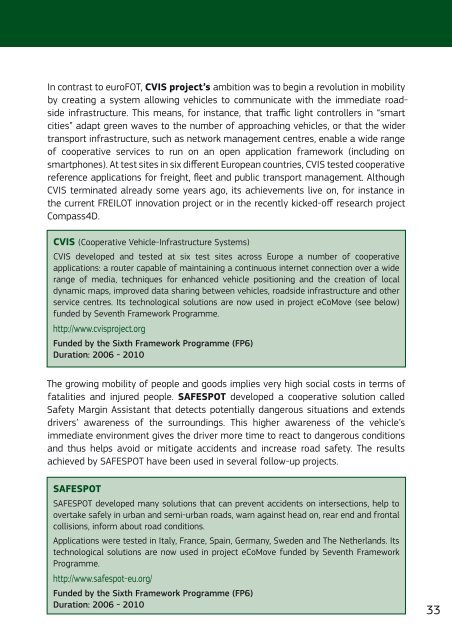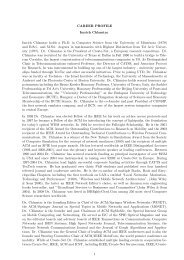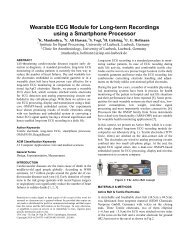ICT for Societal Challenges - European Commission - Europa
ICT for Societal Challenges - European Commission - Europa
ICT for Societal Challenges - European Commission - Europa
You also want an ePaper? Increase the reach of your titles
YUMPU automatically turns print PDFs into web optimized ePapers that Google loves.
In contrast to euroFOT, CVIS project’s ambition was to begin a revolution in mobility<br />
by creating a system allowing vehicles to communicate with the immediate roadside<br />
infrastructure. This means, <strong>for</strong> instance, that traffic light controllers in “smart<br />
cities” adapt green waves to the number of approaching vehicles, or that the wider<br />
transport infrastructure, such as network management centres, enable a wide range<br />
of cooperative services to run on an open application framework (including on<br />
smartphones). At test sites in six different <strong>European</strong> countries, CVIS tested cooperative<br />
reference applications <strong>for</strong> freight, fleet and public transport management. Although<br />
CVIS terminated already some years ago, its achievements live on, <strong>for</strong> instance in<br />
the current FREILOT innovation project or in the recently kicked-off research project<br />
Compass4D.<br />
CVIS (Cooperative Vehicle-Infrastructure Systems)<br />
CVIS developed and tested at six test sites across Europe a number of cooperative<br />
applications: a router capable of maintaining a continuous internet connection over a wide<br />
range of media, techniques <strong>for</strong> enhanced vehicle positioning and the creation of local<br />
dynamic maps, improved data sharing between vehicles, roadside infrastructure and other<br />
service centres. Its technological solutions are now used in project eCoMove (see below)<br />
funded by Seventh Framework Programme.<br />
http://www.cvisproject.org<br />
Funded by the Sixth Framework Programme (FP6)<br />
Duration: 2006 - 2010<br />
The growing mobility of people and goods implies very high social costs in terms of<br />
fatalities and injured people. SAFESPOT developed a cooperative solution called<br />
Safety Margin Assistant that detects potentially dangerous situations and extends<br />
drivers’ awareness of the surroundings. This higher awareness of the vehicle’s<br />
immediate environment gives the driver more time to react to dangerous conditions<br />
and thus helps avoid or mitigate accidents and increase road safety. The results<br />
achieved by SAFESPOT have been used in several follow-up projects.<br />
SAFESPOT<br />
SAFESPOT developed many solutions that can prevent accidents on intersections, help to<br />
overtake safely in urban and semi-urban roads, warn against head on, rear end and frontal<br />
collisions, in<strong>for</strong>m about road conditions.<br />
Applications were tested in Italy, France, Spain, Germany, Sweden and The Netherlands. Its<br />
technological solutions are now used in project eCoMove funded by Seventh Framework<br />
Programme.<br />
http://www.safespot-eu.org/<br />
Funded by the Sixth Framework Programme (FP6)<br />
Duration: 2006 - 2010<br />
33






